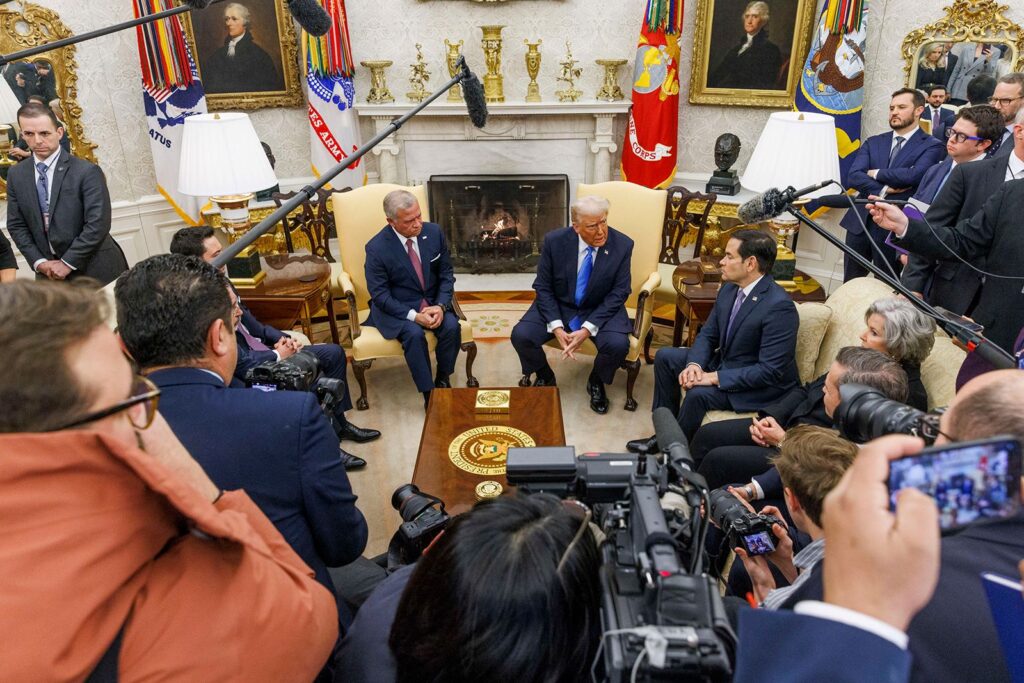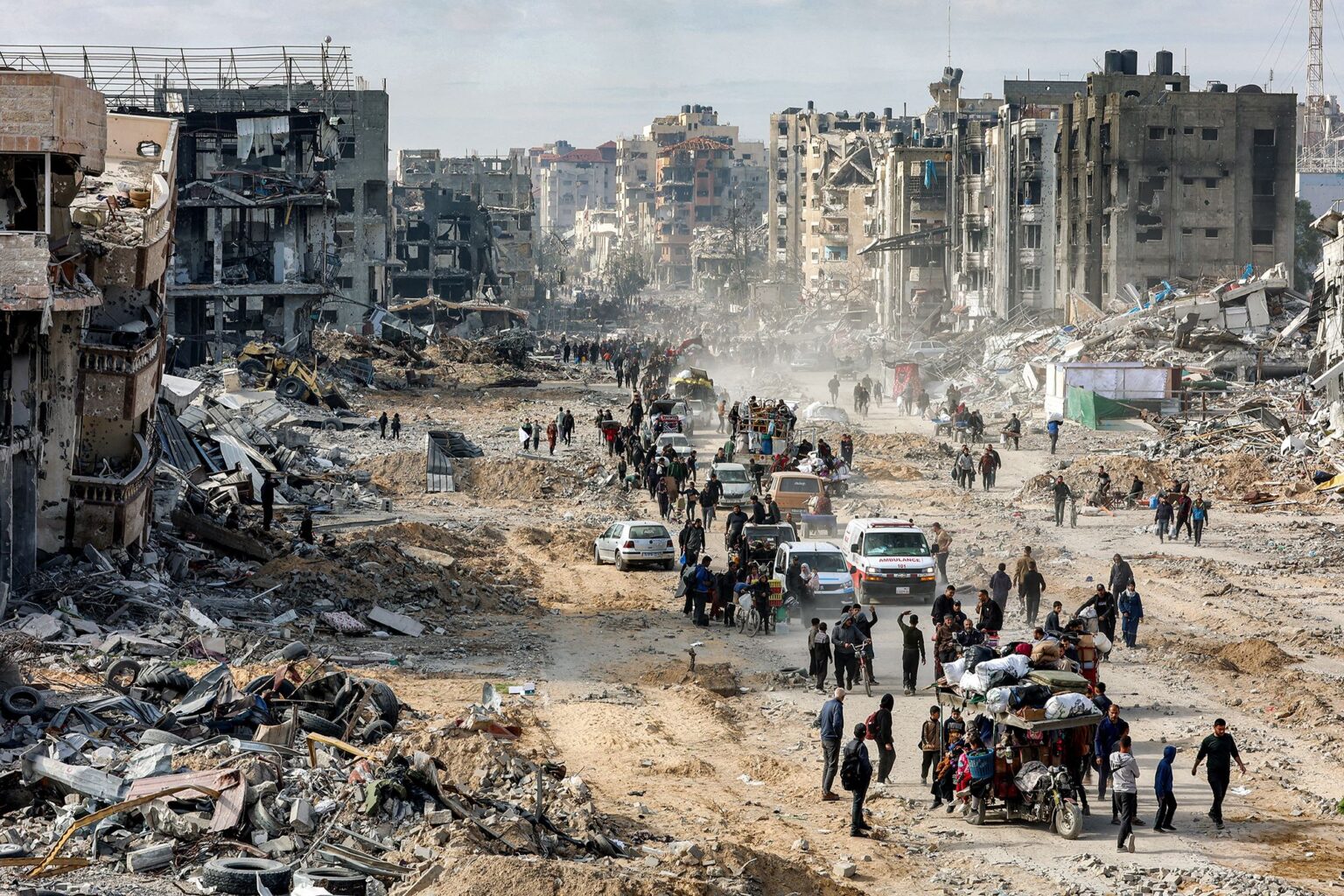Riyadh, Saudi Arabia – In a pivotal diplomatic assembly, leaders from Egypt, Jordan, Saudi Arabia, and other Arab nations gathered in Riyadh on February 21, 2025, to formulate a unified strategy for Gaza’s post-war reconstruction. This summit was convened to present a cohesive front against U.S. President Donald Trump’s contentious proposal to transform the beleaguered enclave into a luxury resort destination, referred to as the “Riviera of the Middle East.”
Trump’s ‘Riviera’ Vision and Regional Apprehensions

President Trump’s plan involves relocating over two million Palestinian residents of Gaza to neighboring Arab countries, subsequently redeveloping the area into a premier tourist hub. This proposal has ignited widespread concern across the Middle East, with critics asserting that it disregards the rights and aspirations of the Palestinian people and poses a risk of further regional destabilization.
The plan has been perceived by many as a potential repetition of the 1948 “Nakba,” during which hundreds of thousands of Palestinians were displaced. The aspect of forced relocation within the proposal has been particularly contentious, with numerous observers viewing it as a form of ethnic cleansing.
Arab Nations Advocate for Indigenous Reconstruction
In response to the U.S. proposal, Arab leaders are championing a reconstruction plan that empowers Palestinians to rebuild their homeland without displacement. Egyptian President Abdel Fattah al-Sisi has called upon the international community to support a comprehensive rebuilding strategy for Gaza that honors the sovereignty and rights of its residents. This approach emphasizes the significance of local governance and sustainable development, aiming to restore stability and hope to the embattled territory.
A source close to the Saudi government indicated that the summit’s discussions centered on formulating “a reconstruction plan to counter Trump’s plan for Gaza.” The proposed alternative seeks to mobilize resources from Gulf Arab states to fund the rebuilding efforts, ensuring that aid is directed straight to Palestinian authorities and communities.
Challenges in Achieving Consensus
While there is a shared commitment to opposing the U.S. plan, Arab nations face challenges in reaching a consensus on the specifics of the reconstruction initiative. Key issues include determining the governance structure of Gaza post-reconstruction and establishing mechanisms to prevent the resurgence of militant groups. Additionally, securing commitments for the substantial financial investments required for the rebuilding process remains a critical concern.
The upcoming Arab League summit, scheduled for March 4 in Cairo, is anticipated to further address these challenges. Leaders aim to finalize a comprehensive plan that not only counters the U.S. proposal but also offers a viable and just solution for the people of Gaza.
International Reactions and Implications
The international community has been closely monitoring these developments. United Nations Secretary-General António Guterres criticized President Trump’s proposal, labeling it as “ethnic cleansing” and urging respect for international law and human rights. European nations have also expressed concerns, emphasizing the necessity for any reconstruction plan to align with the aspirations of the Palestinian people and contribute to lasting peace in the region.
Israel, conversely, has shown support for the U.S. plan, with Prime Minister Benjamin Netanyahu describing it as “the only viable plan to enable a different future.” This stance has further complicated the geopolitical dynamics, as Arab nations seek to counter the proposal while navigating their own diplomatic relations.
The Path Forward
As the March 4 Arab League summit approaches, the urgency to develop a unified and actionable reconstruction plan for Gaza intensifies. The outcome of these discussions holds significant implications not only for the future of Gaza but also for regional stability and the broader quest for peace in the Middle East.
The collective stance of Arab nations against the U.S. proposal underscores a commitment to preserving Palestinian rights and sovereignty. However, translating this commitment into a concrete and effective plan will require diplomatic finesse, substantial financial resources, and unwavering political will.
In the coming weeks, the world will be watching closely as Arab leaders strive to chart a course that honors the resilience of the Palestinian people and fosters hope for a peaceful and prosperous future in Gaza.
Regional Dynamics and Broader Implications
The Riyadh summit also highlighted the intricate regional dynamics at play. Syria’s new President, Ahmed al-Sharaa, was extended an invitation to the upcoming Arab League summit in Cairo, marking a significant step in Syria’s reintegration into the Arab fold following years of civil unrest. Sharaa’s participation is anticipated to influence discussions, especially considering Syria’s historical stance on Palestinian issues and its geopolitical significance in the region.
Concurrently, the economic dimensions of the Middle East’s evolving landscape were underscored at an investment conference in Miami, where Saudi Arabia showcased its ambitious vision for domestic development. U.S. President Donald Trump’s address at the event, alongside leading financial executives, emphasized the burgeoning era of U.S.-Saudi cooperation. This economic collaboration, however, stands in contrast to the political tensions arising from differing perspectives on the Gaza reconstruction plan.
The juxtaposition of economic partnerships and political disagreements illustrates the multifaceted challenges Arab leaders face as they navigate alliances and regional strategies. Balancing economic interests with political sovereignty and humanitarian considerations remains a delicate endeavor, particularly in the context of Gaza’s future.
Public Sentiment and Grassroots Perspectives
Beyond diplomatic corridors, public sentiment across the Arab world reflects a deep-seated solidarity with the Palestinian cause. Grassroots organizations and civil society groups have been vocal in their opposition to any plans that entail the displacement of Gaza’s residents. Demonstrations and campaigns have emerged, advocating for reconstruction efforts that prioritize the rights and dignity of Palestinians.
These grassroots movements emphasize the necessity for reconstruction plans to be inclusive and participatory, ensuring that the voices of Gaza’s residents are central to any decision-making processes. The mobilization of public opinion serves as a potent reminder to Arab leaders of the moral and ethical imperatives underpinning their diplomatic engagements.
Conclusion
The convergence of Arab leaders in Riyadh marks a critical juncture in addressing the complex challenges surrounding Gaza’s reconstruction. As they prepare for the forthcoming Arab League summit in Cairo, the
Saudi Arabia Eyes Major Acquisition of U.S. MQ-9B SeaGuardian Drones



